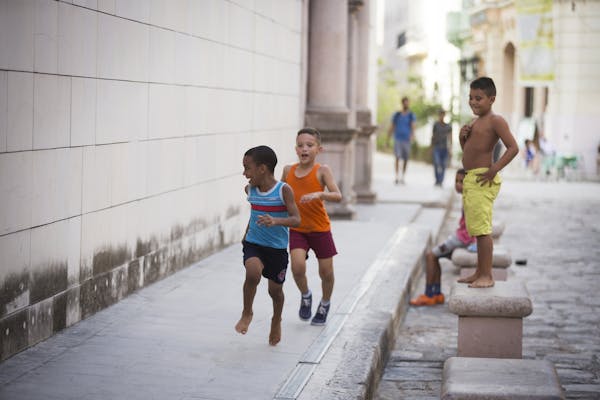HAVANA – David Williamson listened to young Roberto West pluck out some blues on Williamson's stand-up bass.
"Beautiful, very nice," said the Minnesota Orchestra bass player. "I can't play any better than that. But there is one thing … "
Williamson then showed 19-year-old Roberto a few things — holding his fingers down a tad longer on the fret bar, for one, and "always pulling the strings." West gave the lick another go and smiled broadly at his new mentor.
"Yeah, yeah!" Williamson shouted. "Now I can hear every note. And stay loose and relaxed."
Williamson and his orchestra colleagues spent Thursday morning working with students at Escuela Nacional de Música, a high school with 530 students in Havana.
As the first major U.S. orchestra to visit Cuba since President Obama's December overture to normalize relations, the Minnesota Orchestra is here to play concerts Friday and Saturday nights, but the school visits are a key part of this historic trip.
Players were eager, if not a little uncertain of just what to expect. Music, though, proved a universal equalizer.
Complementary sounds filled the school's open plaza as each classroom was host to a different ensemble. From the woodwinds, to the bass, the violin, brass and percussion, the sounds blended in hot air tempered by a nice breeze.
In one jammed room, students played a beautifully tender flute quartet as Adam Kuenzel and Wendy Williams watched. In another — which had the blessed benefit of an air conditioner — Jorge Enrique Amado Molina was called to the front so he could play his original violin composition. Violinist Roger Frisch told Jorge the music reminded him of the early 20th-century composer Eugene Ysaye.
"This is wonderful playing in any country," Frisch told Jorge. "You should be very proud of yourself."
Applause from Jorge's classmates rang off the concrete walls and stone tile floors.
Oboist John Snow encouraged 18-year-old Guillermo Rojas, a rail-thin whip of a musician, to keep his lower lip firm and open his soft palate.
"He made very good suggestions about my embouchure" — the use of facial muscles to shape sound — Guillermo said through a translator. "He told me I had very good style and sound."
Guillermo said the students were very happy and grateful "because it's a very big moment in Cuba. Oboists are a very close family in the world."
It helped, he said, that Snow tried his best with a little Spanish.
Impressed by young players
The students, dressed in uniforms of white shirts over brown slacks and skirts, come from across the country. They were attentive and many held up cellphones to take videos while the orchestra musicians played.
The Minnesotans were deeply impressed by the acumen of the youngsters. A cello quartet, for example, possessed not only rich tone but also palpable emotion.
"I feel I have to go home and practice," said bassist Bill Schrickel to a group of students. "We will stay in touch."
At an afternoon news conference, music director Osmo Vänskä — who was at another school, the Instituto Superior de Arte, with another group of musicians — acknowledged the honor the orchestra feels from being invited to play at the annual Cubadisco Festival this weekend.
He quickly, however, referenced the educational work.
"This is so important for us, working with your young people, your young students," Vänskä said.
Gifts from Minnesota
As the morning wound down in each classroom, Minnesota musicians shared personal gifts with the students, who get scant music supplies in Cuba. Violist Michael Adams spearheaded an effort with three Twin Cities violin shops to get strings, rosin, chin rests and shoulder rests.
"The students are really needy and they don't have parts for their instruments," said Claire Givens of Givens Violins in Minneapolis. "This is an historic moment and we just want to be a part of it all."
Flutist Williams signed one of her favorite flute method books and gave it to a teacher. Schrickel held up a sheaf of sheet music. Most players left their music stands behind.
Some gifts had nothing to do with music. A couple of students grinned and held up new T-shirts: "Minnesota, est. 1858."
These "friendship gifts" are allowed under the cultural exchange, although the orchestra was discouraged from bringing bags full of American goods. The kindness seemed to land with the students, who were genuinely touched. One student greeted the players by showing off his cellphone, festooned with a U.S. flag.
"It was very nice for us," said Daniel Ramirez, who said he learned English from watching a lot of American TV shows. "We all want to be musicians."
That includes Roberto West, who hopes to be a professional.
"I didn't know that way to play the bass; I didn't have any class that way," he said through a translator. "I know it now."
Williamson was plainly impressed with his young student.
"Someday you will be a teacher," he told Roberto. "Then you can show them what you have learned."
Graydon Royce • 612-673-7299
Streetscapes

Critics' picks: The 12 best things to do and see in the Twin Cities this week

6 new foods worth trying at a Timberwolves game

The pandemic made writer Kate DiCamillo realize, 'I'm not going to get through this unless I have a fairy tale to write'

